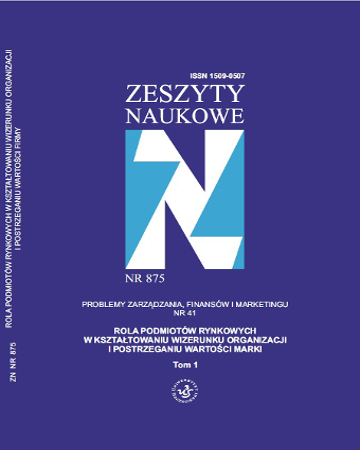
ISSN: 1509-0507
eISSN: 2353-2874
OAI
DOI: 10.18276/pzfm.2015.41/1-21



Lista wydań /
ZN 875 PZFiM nr 41 t. 1
Smart marketing w służbie miast
| Autorzy: |
Magdalena
Daszkiewicz
Uniwersytet Ekonomiczny we Wrocławiu |
| Słowa kluczowe: | smart marketing miasto branding smart city |
| Data publikacji całości: | 2015 |
| Liczba stron: | 14 (263-276) |
Abstrakt
Artykuł poświęcono możliwościom związanym z wykorzystaniem idei smart w marketingu miast. Rozważania teoretyczne poparte analizą przykładów są podstawą do sformułowania własnej propozycji definicji smart marketingu, określenia cech koncepcji oraz wniosków dotyczących wykorzystania idei smart w brandingu miast, co jest możliwe przy uzyskaniu odpowiedniej siły skojarzeń oraz wspieraniu smart marketingu miasta skojarzeniami wynikającymi z zakorzenionych kluczy identyfikacji lub nowych, nowoczesnych identyfikatorów. Należy także rozważyć możliwości i ograniczenia związane z eksploatacją idei smart w marketingu miasta w długim horyzoncie czasowym, w kontekście konkurencyjnym oraz komunikacją w szeroko pojętym otoczeniu.
Pobierz plik
Plik artykułu
Bibliografia
| 1. | About Amsterdam marketing, www.iamsterdam.com/en/amsterdam-marketing/about-amsterdam-marketing. |
| 2. | Amsterdam economic board, the city of Amsterdam, Liander and KPN, www.csreurope.org/impact-map/slic/amsterdam-economic-board-city-amsterdam-liander-and-kpn. |
| 3. | Amsterdam pilot city programme , www.worldsmartcapital.net/amsterdam_pilot_city_programme.html. |
| 4. | Amsterdam smart city: „the idea of the smart city will bring us to a new economy”, www.dac.dk/en/dac-cities/sustainable-cities/experts/amsterdam-smart-city-the-idea-of-the-smart-city-will-bring-us-to-a-new-economy. |
| 5. | Amsterdam: Amsterdam Smart City, „City Climate Leadership Awards”, cityclimateleadershipawards.com/amsterdam-amsterdam-smart-city. |
| 6. | Caragliu A., Del Bo C., Nijkamp P., Smart cities in Europe, „Journal of Urban Technology” 2011, Vol. 18, Iss. 2. |
| 7. | Cocchia A., Smart and digital city: a systematic literature review, w: Smart city, red. R.P. Dameri, C. Rosenthal-Sabroux, Progress in IS, Springer International Publishing Switzerland, 2014. |
| 8. | Dameri R.P. Searching for smart city definition: a comprehensive proposal. International, „Journal of Computers & Technology” 2013, Vol. 11, Iss. 5. |
| 9. | Daszkiewicz M., Wrona S., Kreowanie marki korporacyjnej, Difin, Warszawa 2014. |
| 10. | Dieberger A., Frank A.U., A city metaphor to support navigation in complex information spaces, „Journal of Visual Languages & Computing” 1998, Vol. 9, Iss. 6. |
| 11. | Echtner Ch.M., Ritchie J.R.B., The meaning and measurement of destination image, ,,The Journal of Tourism Studies” 2003, Vol. 14, No. 1. |
| 12. | Florek M., Jak dobrze „sprzedać” miasto przyszłości?, w: Przyszłość miast – miasta przyszłości. Raport ThinkTank, Warszawa 2013. |
| 13. | Giffinger R. et al., Smart cities – ranking of european medium-sized cities, research report, Vienna University of Technology, Vienna 2007, http://www.smart-cities.eu/download/smart_cities_final_report.pdf. |
| 14. | Hancke G.P., Silva B.C., Hancke Jr. G.P., The role of advanced sensing in smart cities. „Sensors” 2013, Vol. 13, Iss.1. |
| 15. | Hollands R.G., Will the real smart city please stand up?: Intelligent, progressive or entrepreneurial?, „City: Analysis of UrbanTrend, Culture, Theory, Policy, Action” 2008, Vol. 12, Iss. 3. |
| 16. | Information communication technologies and city marketing: digital opportunities for cities around the world, red. Gascó-Hernández M., Torres-Coronas T., Information Science Reference – Imprint of: IGI PublishingHershey, PA, 2009. |
| 17. | ITS – intelligent transport systems. 8 new intelligent traffic solutions, kk.sites.itera.dk/apps/kk_pub2/pdf/1205_zA7aIS8D1d.pdf. |
| 18. | Kauf S., Smart w logistyce miejskiej jako warunek rozwoju współczesnych miast, „Gospodarka Materiałowa i Logistyka” 2012, nr 2. |
| 19. | Kotler Ph., Haider D., Rein I., Marketing places, The Free Press, New York 1993. |
| 20. | Laker F., Global brands vs global celebs: who's the smarter marketer?, www.slideshare.net/TMTYL/global-brands-vs-global-celebs-whos-the-smarter-marketer. |
| 21. | Make Copenhagen your personal business, „Copenhagen Capacity”, talentcapacity.org/media/1161/talentstrategi_2014.pdf. |
| 22. | Meffert H., Städtemarketing – Pflicht oder Kür?, w: Planung und Analyse 16, H. 8, Jahrgang 1989. |
| 23. | Moilanen T., Rainisto S.K., How to brand nations, cities and destinations, Palgrave Macmillan, New York 2009. |
| 24. | Otgaar A. et al., Empowering metropolitan regions through new forms of cooperation. Ashgate Publishing Limited, Hampshire 2008. |
| 25. | Schaffers H. et al., Smart cities and the future internet: towards cooperation frameworks for open innovation, w: The Future Internet, red. J. Domingue et al., „Lecture Notes in Computer Science” 2011, Vol. 6656. |
| 26. | Smart Society, amsterdamsmartcity.com/projects/theme/label/smart-society?lang=en. |
| 27. | Sznajder A., Technologie mobilne w marketingu, Oficyna Wolters Kluwer business, Warszawa 2014. |
| 28. | Szromnik A., Marketing terytorialny, Oficyna Wolters Kluwer business, Kraków 2007. |
| 29. | Van Bastelaer B., Lobet-Maris C., Social learning regarding multimedia developments at a local level: The case of digital cities, Namur: CITA – University of Namur, 1999. |
| 30. | Wdowiarz-Bilska M., Od miasta naukowego do smart city, „Czasopismo Techniczne. Architektura” 2010, z. 1–A/2. |
| 31. | Why Copenhagen?, www.gladsaxe.copcap.com/content/us/doing_business/why_copenhagen. |